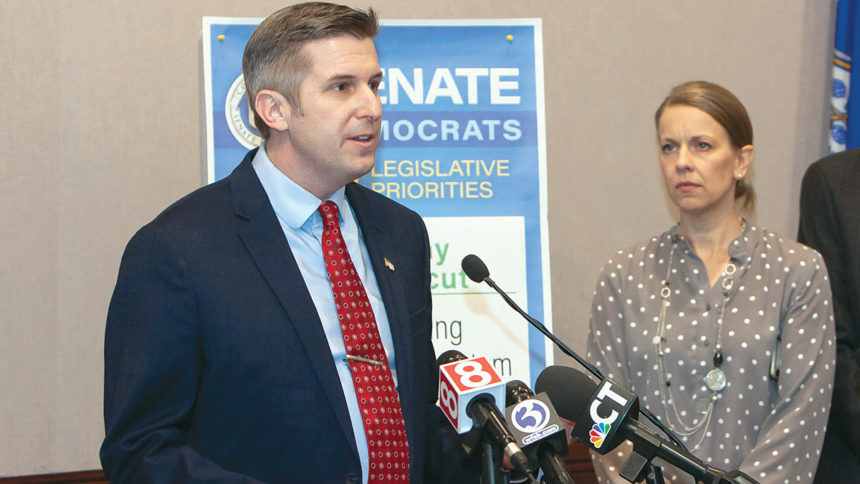
CONNECTICUT — A proposal from Democrats in the state Senate would require disclosure of the specific number of direct care staff in a nursing home assigned to provide care to residents.
The move stems from 2018 research by Kaiser Health News indicating many nursing homes were not distinguishing between staff performing administrative work versus direct care. The state has around 27,000 nursing home beds.
Senate Bill 375, which Committee on Aging co-chairman Sen. James Maroney (D-Milford) told the Connecticut Mirror was a “consumer protection bill,” said staff levels for patient care have a link to positive patient outcomes. He noted that aides are often overburdened by patient load on the weekends.
Matthew V. Barrett, president and CEO of the Connecticut Association of Healthcare Facilities, praised the legislators for drawing attention to nursing home staffing but added that his members have suffered for years due to poor reimbursement rates.
“Much work needs to be done,” Barrett said. “You could call it a lost decade in terms of nursing home funding.”
SOUTHWEST
Hacienda to stay open
ARIZONA — The state agreed to work with Hacienda HealthCare to allow it to stay open, as the governor pushed for additional scrutiny of long-term care facilities in February. The actions stem from the fallout of a sexual assault at the Phoenix facility that resulted in the surprise birth of a baby.
Hacienda informed the state in early February that it would close its Intermediate Care Facility for the Intellectually Disabled after the discovery of the assault of a severely disabled 29-year-old resident, who gave birth in December.
But the facility and the Arizona Department of Health Services came to an agreement where Hacienda would stay open under voluntary regulation that includes an outside consultant and onsite evaluator.
“Given the high medical risks associated with transferring these patients, moving this medically fragile community is the option of last resort and not the state’s goal,” the health department said in a statement. “Entering into an agreement with ADHS is the best immediate outcome for all parties involved and will ensure the ongoing safety of the residents at Hacienda.”
Meanwhile, Gov. Doug Ducey (R) issued an executive order on Feb. 6, directing state agencies to bolster protections for individuals with disabilities in long-term care facilities. He’s also mandating that providers who receive state funds better train employees on how to spot signs of abuse.
NORTHEAST
Transport company ripped
RHODE ISLAND — In the months since Rhode Island switched to a new Medicaid transportation provider, nursing home advocates said every day has put residents at life-threatening risk.
“Someone is going to die,” former state senator John Tassoni Jr. said at a hearing in February.
Rhode Island first moved from LogistiCare to Missouri-based Medical Transportation Management Jan. 1. That switch has been a bumpy ride, literally and figuratively, with a flood of missed appointments, delays and other problems, according to those who testified at a state committee meeting.
Tassoni, who is now an executive with the Mental Health Leadership Council of Rhode Island, called Medical Transportation Management’s short tenure “38 days of hell.”
More than 1,000 complaints have been filed, with many patients missing scheduled chemotherapy, dialysis, methadone treatment or doctor visits. Some local nursing homes leaders have transported residents using personal vehicles.
“Frankly, at this point it’s become a fiasco,” said Christopher Ryan, owner and administrator of the 71-bed Pine Grove Health Center nursing facility in Pascoag, RI. “At what point does this end?”
Employees trained to tell
NEW YORK — Unionized New York nursing home workers are receiving training from the state health department on how they can be more proficient at reporting violations.
An official with the Center for Healthcare Provider Services and Oversight taught members of Local 1199 chapter of the Service Employees International Union in late January. The arrangement is the first of its kind in New York, the Buffalo News reported.
The employees were encouraged to nail down all the particulars of an incident, such as time, location and witnesses. Possible areas of focus included unsafe staffing, lack of supplies and the use of lifts to move residents. Union officials said they believe it is important to have more sets of eyes watching out for vulnerable elders.
The Jan. 24 training session in Buffalo featured Mark Hennessy, director of the Center for Provider Services and Oversight at the New York State DPH.
From the March 1, 2019 Issue of McKnight's Long-Term Care News




